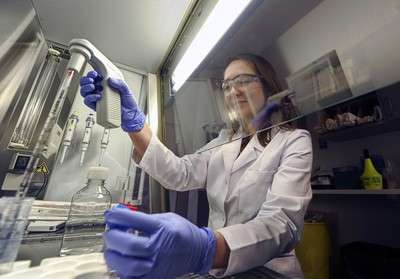Leukemia like Achilles, has its own weakness

Leukemia cells from chronic myeloid leukemia patients, especially those in the advanced stage, lack the BRCA1 protein. Importantly, the protein is not present even if the patient carries the proper, unmutated gene responsible for BRCA1 production.
Scientists from the Nencki Institute, in Warsaw, Poland, showed that BRCA1 deficiencies in patients with the functional gene are caused by defects in the protein synthesis process. This discovery not only explains the mechanism that support leukemia development, but also uncovers its weakness. Results of this project, performed in collaboration with the group of Prof. Tomasz Skorski from the Temple University School of Medicine in Philadelphia, might lead to improvement of diagnostics in leukemia, and in the future, could benefit development of better, more efficient therapies leading to cure of patients.
Chronic myeliod leukemia (CML) is diagnosed in about 25% of adult leukemia patients. The disease is caused by the translocation between chromosomes 9 and 22. This leads to the generation of the fusion chromosome, known as Philadelphia chromosome, and a new fusion gene coding a new protein: BCR-ABL1 kinase. The presence of BCR-ABL1 kinase results in activation of signaling pathways that promote and are responsible for development of chronic myeloid leukemia.
The disease starts from a chronic phase with mild symptoms, then progresses into the highly malignant blast phase associated with appearance of immature hematopoietic cells (blasts) in the blood. At this stage of the disease, leukemia cells are usually resistant to current therapies.
"We are trying to understand mechanisms responsible for development of the disease and resistance to treatment. We also are looking for strategies to eliminate leukemia cells, including leukemia stem cells, because this is the only way to cure CML. We want to find new therapeutic targets for novel, potentially more efficient therapeutic strategies," says Dr. Katarzyna Piwocka, associate professor at the Nencki Institute.
Cancer cells accumulate numerous DNA double-strand breaks (DSBs). BRCA1 is one of the crucial proteins involved in DSB repair processes and DNA stability. Mutations in the BRCA1 gene are commonly associated with predisposition for breast and ovarian cancers. When BRCA1 is present, cells might faithfully repair DSBs or induce apoptosis to eliminate cells with too many breaks – both would be adverse for the growing cancer. So the BRCA1 deficiency strongly promotes cancer development. Indeed, due to previous research performed by Dr. Piwocka's team and other research groups, it is established that the level of BRCA1 is significantly decreased in advanced phases of CML. Until now, such deficiencies were connected with the gene mutations. Researchers from the Nencki Institute discovered that in leukemia, another factor is responsible for BRCA1 deficiency.
Microenvironments in which cancer cells grow are very unfriendly for them. To survive and grow, cancer cells have to activate or change multiple signaling pathways, in order to adapt to microenvironmental conditions. One protective, prosurvival mechanism is a signaling pathway known as adaptative stress response, which can inhibit synthesis of BRCA1 protein.
"Our data demonstrated that BRCA1 synthesis is diminished in the advanced stage of CML. The gene coding for BRCA1 protein is not mutated, however, BRCA1 mRNA, which is necessary for the protein production, is aggregated and stored in protein complexes, and thus not available for the protein synthesis," says Dr. Paulina Podszywałow-Bartnicka, the first author of the publication in the Cell Cycle journal.
Current diagnostics procedures concentrate on the detection of mutations in the BRCA1 gene. The work presented by the researchers suggests that BRCA1 protein deficiency can occur more frequently than previously supposed.
This discovery not only increases our knowledge about the biology of leukemia, but opens paths for novel anti-leukemia therapies. We know today that BRCA1 deficiency, which supports cancer, can also be used as a weapon against cancer cells. Novel anti-tumor therapies based on the concept of synthetic lethality take advantage of the fact that some signaling pathways or genes are inactivated or mutated in cancer cells.
"When a cell has damaged one signaling pathway or one gene, it may function properly due to alternative pathways, which usually exist. When this alternative pathway is inhibited, cells lose the ability to survive," explains Prof. Tomasz Skorski, and adds: "As we now know that one of the DSB repair pathways that depend on BRCA1 is blocked in leukemia cells, we can try to find the alternative, parallel pathway and inhibit it as well. This will lead to activation of the suicide process – apoptosis by a mechanism known as synthetic lethality. This will not be the case in normal healthy cells, because they still have functional BRCA1-dependent signaling. Therapies based on BRCA1 deficiency are currently investigated in clinical trials".
Therapeutic regimes routinely used in CML usually do not cure patients. They control the chronic phase of the disease and delay advanced phases, but they do not protect from resistance. Therapies based on the synthetic lethality open new possibilities for developing novel, personalized therapies, which can eliminate leukemia cells, including the leukemia stem cells, which are responsible for disease relapse and malignant progression.
More information: "Downregulation of BRCA1 protein in BCR-ABL1 leukemia cells depends on stress-triggered TIAR-mediated suppression of translation." Cell Cycle 2014, 13(23):3727-41. DOI: 10.4161/15384101.2014.965013















